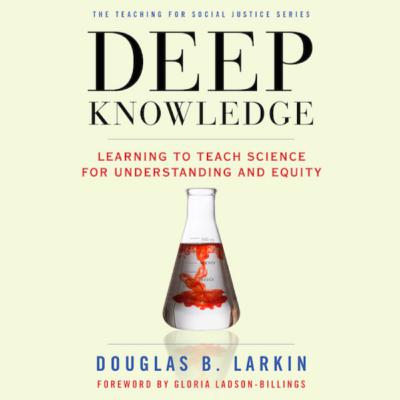Discover Deep Knowledge: Learning to Teach Science for Understanding and Equity
Deep Knowledge: Learning to Teach Science for Understanding and Equity

Deep Knowledge: Learning to Teach Science for Understanding and Equity
Author: Doug Larkin
Subscribed: 2Played: 5Subscribe
Share
© Doug Larkin
Description
Deep Knowledge is a book about how people’s ideas change as they learn to teach science. Using the experiences of six middle and high school teachers as they learn to teach science in diverse classrooms, this book explores how their work changes the way they think about students, society, schools, and science itself.
11 Episodes
Reverse
Drawing the map, landmarks, and looking on the internal in learning to teach science in diverse classrooms.
Written for the original edition of the book but cut for space, this chapter is new to this 10th anniversary edition of Deep Knowledge. I present myself here in a fictional roundtable dialogue with the four fictional individuals, each representing and giving voice to a particular viewpoint regarding the practice and theory of science teacher education as we discuss the six cases in the book. Much appreciation to my colleagues Dr. Bryan A. Brown, Dr. tara Nkrumah, Dr. Enrique Suarez, and Dr. Greses Perez for joining me over Zoom for an evening to record this episode. The transcript for this chpater (with references) may be found here: https://www.montclair.edu/profilepages/media/3129/user/chapter8dialogicinterlude.pdf
My sophomore year of high school, I walked into my first chemistry class and everything simply clicked—the years of bathroom-laboratory experimentation, speculation about what the world was made of, and a general aptitude for science finally made sense. This is what I was meant to do, chemistry was my calling. — Roberta
"After a while I just get claustrophobic inside. That's the hardest part about being in a classroom every day" — Kathy
I’ve had to relearn and unthink some old ideas. In the physics realm I took some classes that were new, but I found my grasp of some of things that I supposedly knew wasn’t all that good. —Jethro
I don’t think it’s valuable to teach things kids don’t want to learn. And if they don’t want to learn something that’s really valuable, then it’s a failure on my part. —Armando
I don’t think I could have been a teacher without having been a mom. I didn’t have the patience for it when I was twenty-two. I know kids need that patience, they need that time, they need your attention, and I wasn’t willing to give it at that point in time. I didn’t realize how much I was willing to give kids until after I became a mom. —Corrine
"The issue of race is especially touchy for me...I hate to say it, I'd almost be tempted to sacrifice a little bit of good science to protect myself...I don't want to lose my job, quite frankly. I like teaching. And this is a touchy subject, and it's weird and fearful for me." — Tyler
The notion that individuals acquire or build knowledge for teaching, as if they are collecting toy blocks to assemble a tall tower, bears little if any resemblance to the messy processes by which people learn to teach.
This introduction to the book presents the story of learning how to use a Van de Graaff generator (a.k.a. that aluminum dome in phsyics class that gives off jolts of electricity and makes hair stand up). Three stories involving this machine track three of the main concerns of science teachers: learning science, learning to be a teacher, then learning to teach science for equity and understanding. I had hoped to keep the unpleasant shocks to a minimum. That was overly optimistic.
The 10th anniversary of the publication of Deep Knowledge: Learning to Teach Science for Understanding and Equity will see the release of a companion podcast, with one chapter dropping each week beginning January 1, 2024.





